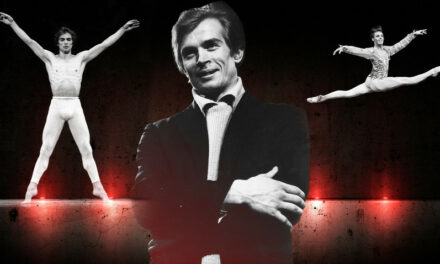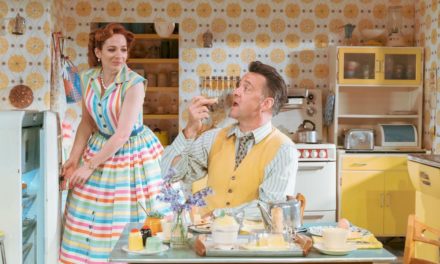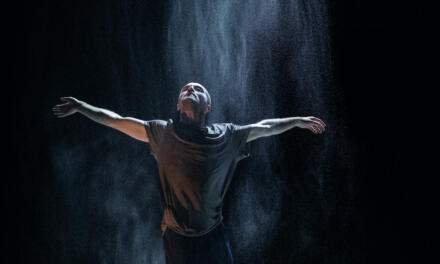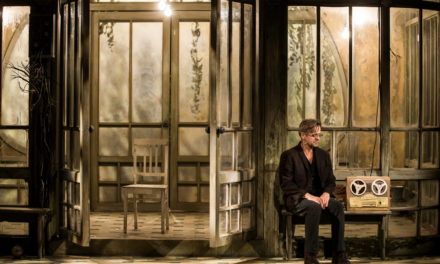Of all the theatrical languages that coexist in Moscow, director Kama Ginkas is an intonation unto himself. You can hear it in his actors’ speech.
“They often speak not as they do in life or even on stage for another director. They speak Ginkas.”
Ginkas’ intonation, like a voiceprint, is unique. It cannot be imitated or mistaken.
In Ginkas’ newest production, his own dramatization of Anton Chekhov’s mystical story, The Black Monk, the music of the director’s personal intonation is in evidence everywhere.
Here, I no longer mean the actors’ voices–although their parched, ironic declarative speech patterns could only be found in a Ginkas show–rather, I mean the tonality, the style, the manner of the performance as a whole. This world, this vision of a man finding himself trapped in a savage battle between genius and insanity or, perhaps, inspiration and banality, bears all the marks and all the challenges of a Kama Ginkas production.
And yet – and this is one of the keys to what makes Ginkas such a brilliant director – he has recalibrated everything that is characteristic of his art in order to create something new and self-sufficient. One need know nothing about Ginkas to perceive and appreciate the power of The Black Monk. On the other hand, if you are familiar with any of the director’s legendary Moscow productions of the 1990s – We Play ‘Crime, K.I. From ‘Crime, The Execution Of The Decembrists, or Pushkin. Duel. Death, to name a few–you will recognize a major departure in The Black Monk which, at the same time, carries on the tradition.
In the early 1990s, Ginkas worked as much in Helsinki as in Moscow. And it became a truism that his productions there were more lyrical, more gentle than those he staged in Moscow. While earning the reputation as one of Moscow’s most innovative directors, Ginkas has also rubbed some observers the wrong way for what they consider his excessive interest in pathology.
The Black Monk strikes me as the most “Finnish” of Ginkas’ Moscow productions. Ginkas has always been a poet–his brusque, sparing use of gestures, props, and music resembles the process of elimination a poet goes through in selecting ideal words–but The Black Monk is easily the most “poetic,” or lyrical, of the director’s Moscow shows. This is true despite the hard truths it ultimately tells. The show’s mellifluous “poetry” is echoed in the warm, earth-colored costumes, the rustic birch gazebo positioned amidst a “garden” or “field” of brittle peacock feathers in which the actors move and–at least at first–in the actors’ tender, reassuring, understated tones of voice.
In The Black Monk, the 30-something Kovrin escapes his busy academic schedule in the city and visits his friend Pesotsky and Pesotsky’s daughter Tanya in the country. Pesotsky is an avid gardener; his daughter is a stalwart type with, shall we say, pretensions of sensitivity. One lazy evening, Kovrin tells Tanya the strange and intriguing legend of a mysterious Black Monk who first appeared on Earth a thousand years ago and may soon return. Shortly thereafter, the Monk indeed appears to Kovrin, first in moments of solitude, later even in company.
Inspired by the Monk, who instills in him notions of splendor and genius, Kovrin marries Tanya amidst a flourishing of hope and confidence. However, Tanya and her father interpret Kovrin’s continuing obsession with the Monk as a sign of insanity and–with disastrous results for all–they “heal” him of his malady.
As Kovrin, Sergei Makovetsky turns in what is to my mind his finest theatrical performance. Best known as a film star, he has also been a prominent theater actor, most notably in the productions of Roman Viktyuk. But under Ginkas’ guidance, Makovetsky achieves smoothness and sense of purpose I have missed in him before. Makovetsky’s Kovrin is deceptively calm and cool, his gentle irony and sensitivity masking an inner complexity that feeds his ambitions for greatness. The puzzle of Kovrin’s personality remains even after the finale–was this man a potential genius who let himself be destroyed by conforming to normative behavior, or was he an unfortunate mediocrity who succumbed to visions of grandeur?
On one level, Ginkas suggests we should celebrate, rather than eradicate, our eccentricities. But on a more profound level, he, like Chekhov, leaves unanswered the question of whether Kovrin is a genius or an inflated banality. We suspect the latter, but then there is the Black Monk still suggesting otherwise. It is the open-ended nature of the show–and of Ginkas’ art in general that draws us in and makes us participate in the theatrical event. If Makovetsky’s Kovrin is this production’s natural and undisputed center, Igor Yasulovich’s Black Monk is its meat.
As nervous, comical and elusive as a petty demon, Yasulovich also projects a dual sense of danger and magnificence. He is the catalyst that raises this show to the heights. He is the conduit who brings us to the brink of understanding and leaves us trembling as we contemplate what comes next.
Sergei Barkhin’s brilliant set is a major player. He built a crude wooden stage in the theater’s balcony and wrapped 150 spectators around three sides of it. That leaves us all peering out into the chasm of the theater and main stage down below, as if at any moment, someone may go right over the edge. Those gorgeous, fragile peacock feathers remind us of the potential and the dreams that are so carelessly trampled underfoot as life stumbles on.
This article originally appeared in The Moscow Times in 1999 by John Freedman. It is reposted here with permission.
This post was written by the author in their personal capacity.The opinions expressed in this article are the author’s own and do not reflect the view of The Theatre Times, their staff or collaborators.
This post was written by John Freedman.
The views expressed here belong to the author and do not necessarily reflect our views and opinions.

















